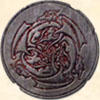Normal Movement
A character has a "normal" movement rate that is inherent by race. For most characters this will be either 12 or 6. This number can be adjusted up or down by four things.
- Muscle Adjustment
- Balance Adjustment
- Encumbrance Category
- Fatigue Category
note: At this time KloOge automatically computes the Adjusted Movement except as modified by the Embumbrance modifiers. The player will have to ensure their character sheets are up to date.
Muscle Adjustment is added or subtracted to the base movement rate
Balance Adjustment is added or subtracted to the base movement rate.
Encumbrance will change the movement rate based on weight carried
Fatigue will affect the Encumbrance Category and therefore movement rate as well.
| Encumbrance Category | |||
| THAC0 | AC | Initiative Modifier | |
| Severe | -4 | +3 | +15 |
| Heavy | -2 | +1 | +10 |
| Moderate | -1 | 0 | +5 |
| Light | 0 | 0 | none |
| None | 0 | 0 | none |
Fatigue
| Fatigue Category | Effect |
| Fresh | No Effect |
| Fatigued | +1 encumbrance category |
| Exhausted | +2 encumbrance categories |
These numbers combine to give a character a movement in a wide range from 1 to 17 or more to move during a round without taking Encumbrance or Fatigue into account.
Characters can also move faster that this in a round by running (doubling their speed) or sprinting (tripling their speed) in a round. Every round spend running after the first two a character must make a Fitness check to avoid becoming fatigued with a cumulative -1 to the roll each time it is made. Every round spent sprinting after the first one a character must make a Fitness check to avoid becoming fatigued with a cumulative -2 to the roll each time it is made.
Cross Country Movement
{see Overland Movement for mounts and vehicles}
A normal day's marching lasts for 10 hours, including reasonable stops for rest and meals. Under normal conditions, a character can walk twice his normal movement rate in miles in those 10 hours. Thus, an unencumbered man can walk 24 miles across clear terrain.
Characters can also force march, intentionally hurrying along, at the risk of exhaustion. Force marching enables a character to travel 2 1/2 times his movement rate in miles (thus, a normal man could force march 30 miles in a day). At the end of each day of the march, the character or creature must roll a Fitness check. Large parties (such as army units) make the check at the average Fitness of the group (weaker members are supported, encouraged, and goaded by their peers). Creatures must roll a saving throw vs. death at the end of each day's force marching (since they lack Fitness scores). A -1 penalty is applied to the check for each consecutive day spent force marching. If the check is passed, the force marching pace can be continued the next day. If the check fails, no more force marching attempts can be made until the characters have completely recovered from the ordeal. Recovery requires half a day per day of force marching.
Even if the Fitness check fails, the character can continue overland movement at his normal rate.
One drawback of force marching is that each day of force marching results in a -1 penalty to all attack rolls. This modifier is cumulative. Half a day's rest is required to remove one day's worth of force marching penalty. Characters who have managed to force march for eight straight days suffer a -8 penalty to their attack rolls; it takes four days of rest to return to no attack roll penalty.
Overland movement rates can be increased or decreased by many factors. Terrain can speed or slow movement. Well-tended roads allow faster marching, while trackless mountains slow marches to a snail's pace. Lack of food, water, and sleep weaken characters. Poor weather slows their pace.
